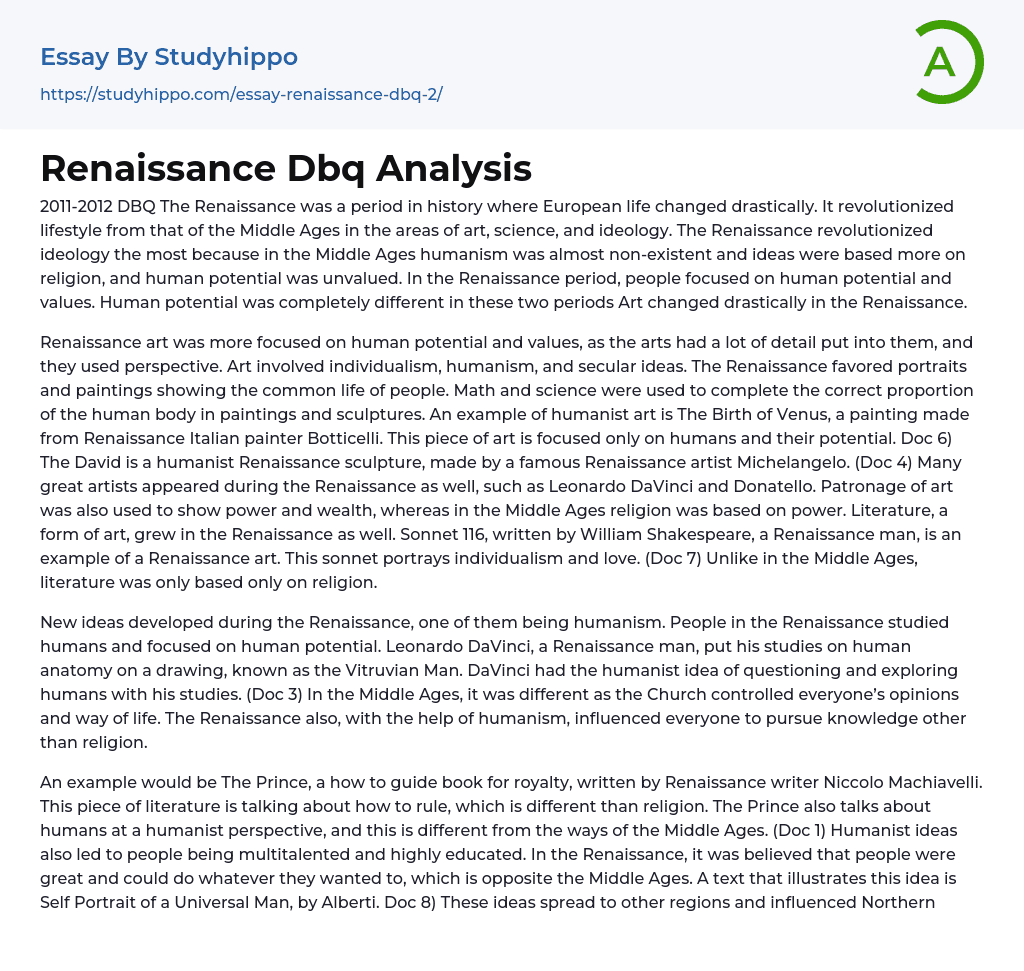2011-2012 DBQ The Renaissance was a period in history where European life changed drastically. It revolutionized lifestyle from that of the Middle Ages in the areas of art, science, and ideology. The Renaissance revolutionized ideology the most because in the Middle Ages humanism was almost non-existent and ideas were based more on religion, and human potential was unvalued. In the Renaissance period, people focused on human potential and values. Human potential was completely different in these two periods Art changed drastically in the Renaissance.
Renaissance art was more focused on human potential and values, as the arts had a lot of detail put into them, and they used perspective. Art involved individualism, humanism, and secular ideas. The Renaissance favored portraits and paintings showing the common life of people. Math and science wer
...e used to complete the correct proportion of the human body in paintings and sculptures. An example of humanist art is The Birth of Venus, a painting made from Renaissance Italian painter Botticelli. This piece of art is focused only on humans and their potential. Doc 6) The David is a humanist Renaissance sculpture, made by a famous Renaissance artist Michelangelo. (Doc 4) Many great artists appeared during the Renaissance as well, such as Leonardo DaVinci and Donatello. Patronage of art was also used to show power and wealth, whereas in the Middle Ages religion was based on power. Literature, a form of art, grew in the Renaissance as well. Sonnet 116, written by William Shakespeare, a Renaissance man, is an example of a Renaissance art. This sonnet portrays individualism and love. (Doc 7) Unlike in the Middle Ages, literature was only based only o
religion.
New ideas developed during the Renaissance, one of them being humanism. People in the Renaissance studied humans and focused on human potential. Leonardo DaVinci, a Renaissance man, put his studies on human anatomy on a drawing, known as the Vitruvian Man. DaVinci had the humanist idea of questioning and exploring humans with his studies. (Doc 3) In the Middle Ages, it was different as the Church controlled everyone’s opinions and way of life. The Renaissance also, with the help of humanism, influenced everyone to pursue knowledge other than religion.
An example would be The Prince, a how to guide book for royalty, written by Renaissance writer Niccolo Machiavelli. This piece of literature is talking about how to rule, which is different than religion. The Prince also talks about humans at a humanist perspective, and this is different from the ways of the Middle Ages. (Doc 1) Humanist ideas also led to people being multitalented and highly educated. In the Renaissance, it was believed that people were great and could do whatever they wanted to, which is opposite the Middle Ages. A text that illustrates this idea is Self Portrait of a Universal Man, by Alberti. Doc 8) These ideas spread to other regions and influenced Northern Europe. Science also grew during the Renaissance. Many inventions were created. One topic in the Renaissance that grew was astronomy. Two inventions that helped with the study of astronomy is the telescope and the Astrolabe, these are used to predict positions of the sun, moon, planets, and stars. (Docs 9 and 10) Renaissance people advanced in science by creating these inventions and putting them to their own use. The Printing
Press, a machine that makes copies of books, made by Guttenberg, was also an advancement in science. Doc 11) This printing press also spread scientific ideas throughout regions. The printing press could make 500 books in 5 months while a copyist could make 1 book in 5 months. Scientists like Copernicus studied the sky and made the discovery that the earth revolves around the sun in the heliocentric theory, rather than the previously believed geocentric theory from the Middle Ages. (Doc 2) These inventions were a great advancement in science. The Renaissance changed lives drastically. The Renaissance has completely revolutionized European life, effecting aspects such as the art, science, and ideology of the time.
- Age Of Enlightenment essays
- Ethos essays
- Time essays
- Acceptance essays
- Meaning Of Life essays
- Reality essays
- Natural Law essays
- Political Philosophy essays
- Utilitarianism essays
- Existence essays
- Free Will essays
- Good And Evil essays
- Confucianism essays
- Relativism essays
- Conscience essays
- Environmentalism essays
- Empiricism essays
- Epistemology essays
- Ethics essays
- Existentialism essays
- Human Nature essays
- Individualism essays
- Metaphysics essays
- Philosophy Of Life essays
- Transcendentalism essays
- Truth essays
- Destiny essays
- Determinism essays
- Fate essays
- Functionalism essays
- Philosophers essays
- Pragmatism essays
- Future essays
- Child Observation essays
- Critical Reflection essays
- Teaching Philosophy essays
- Personal Philosophy essays
- Action Speak Louder Than Words essays
- Can Money Buy Happiness essays
- Values of Life essays
- Ethical dilemma essays
- Normative Ethics essays
- Virtue Ethics essays
- Belief essays
- Deontology essays
- Moral essays
- Virtue essays
- Work Ethic essays
- Henry David Thoreau essays
- Carl Jung essays




